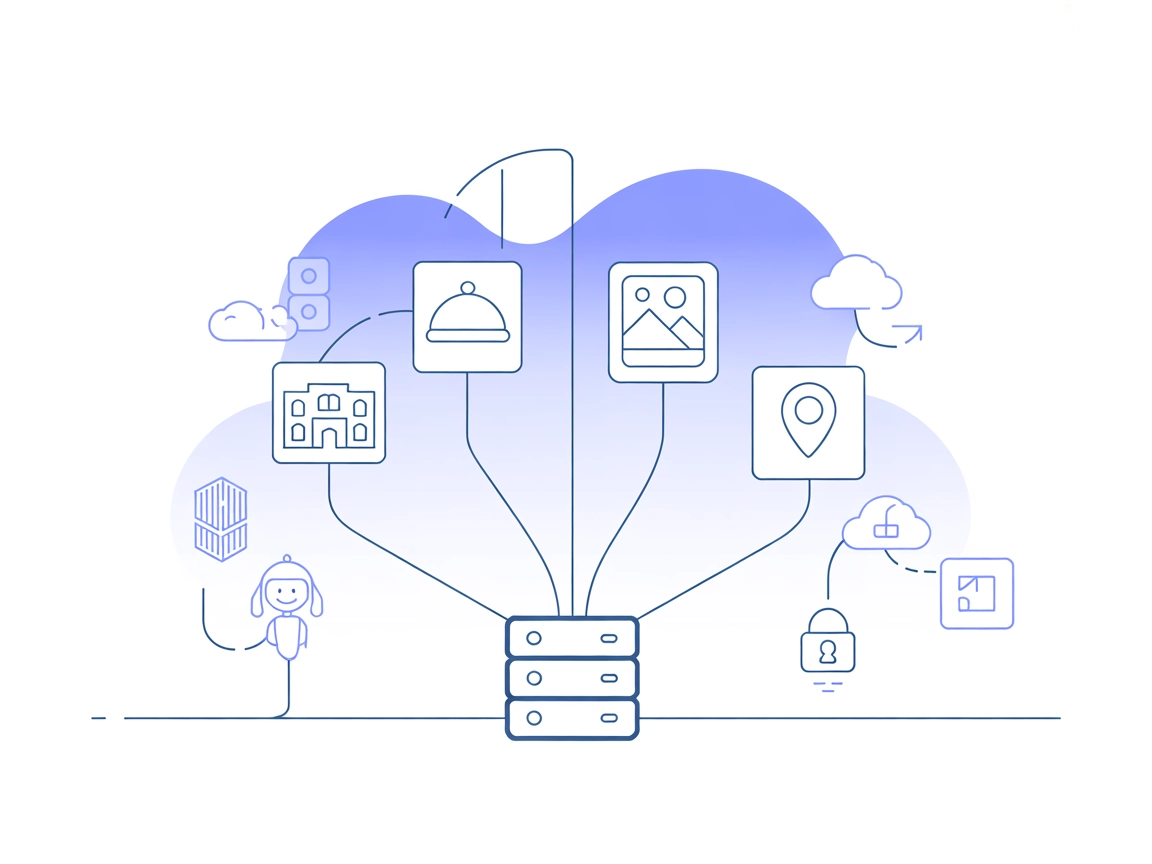
Travel Planner MCP Server
The Travel Planner MCP Server connects AI assistants to real-time travel data using the Google Maps API, enabling intelligent itinerary generation, place discov...

The map-traveler MCP Server lets your AI agents explore, interact with, and retrieve information about geographic locations virtually—powering map-based queries, travel simulations, and location-aware AI workflows.
FlowHunt provides an additional security layer between your internal systems and AI tools, giving you granular control over which tools are accessible from your MCP servers. MCP servers hosted in our infrastructure can be seamlessly integrated with FlowHunt's chatbot as well as popular AI platforms like ChatGPT, Claude, and various AI editors.
The map-traveler MCP (Model Context Protocol) Server acts as a virtual traveler library, designed to interface with MCP-compatible clients and AI assistants. Its primary purpose is to enable AI systems to explore, interact with, and retrieve information about geographic locations in a virtualized manner. This allows developers to integrate map-based data, simulate travel experiences, or perform geographic queries within their AI-driven workflows. By connecting external data sources such as mapping APIs or virtual street views, the server facilitates tasks like location search, pathfinding, and contextual information retrieval, enhancing the capabilities of AI assistants that require spatial or geographic awareness.
No prompt templates are explicitly listed in the repository.
No explicit MCP resources are described in the repository.
No explicit list of tools is provided in the repository files or documentation.
Virtual Travel Simulations
Allow AI agents or users to virtually traverse different locations, simulating travel experiences for education, entertainment, or planning purposes.
Geographic Data Exploration
Enable AI systems to query and present information about specific locations, landmarks, and routes, supporting applications in travel planning or geographic research.
Location-based Recommendations
Integrate with AI assistants to provide contextually relevant recommendations (e.g., nearby attractions or restaurants) based on virtual location data.
Route Visualization and Navigation
Assist users or agents in visualizing routes and navigating through virtual maps, useful in logistics planning or educational demonstrations.
Contextual Mapping for AI Workflows
Enhance AI-driven workflows that require spatial context, such as generating travel narratives, answering geographic questions, or augmenting user conversations with location details.
windsurf.json).mcpServers object as shown below.Example JSON configuration:
{
"mcpServers": {
"map-traveler": {
"command": "npx",
"args": ["@map-traveler/mcp-server@latest"]
}
}
}
Example JSON configuration:
{
"mcpServers": {
"map-traveler": {
"command": "npx",
"args": ["@map-traveler/mcp-server@latest"]
}
}
}
cursor.json).Example JSON configuration:
{
"mcpServers": {
"map-traveler": {
"command": "npx",
"args": ["@map-traveler/mcp-server@latest"]
}
}
}
Example JSON configuration:
{
"mcpServers": {
"map-traveler": {
"command": "npx",
"args": ["@map-traveler/mcp-server@latest"]
}
}
}
Securing API Keys using Environment Variables
To keep API keys secure, use environment variables in your configuration. Example:
{
"mcpServers": {
"map-traveler": {
"command": "npx",
"args": ["@map-traveler/mcp-server@latest"],
"env": {
"MAP_API_KEY": "${MAP_API_KEY}"
},
"inputs": {
"apiKey": "${MAP_API_KEY}"
}
}
}
}
Using MCP in FlowHunt
To integrate MCP servers into your FlowHunt workflow, start by adding the MCP component to your flow and connecting it to your AI agent:

Click on the MCP component to open the configuration panel. In the system MCP configuration section, insert your MCP server details using this JSON format:
{
"map-traveler": {
"transport": "streamable_http",
"url": "https://yourmcpserver.example/pathtothemcp/url"
}
}
Once configured, the AI agent is now able to use this MCP as a tool with access to all its functions and capabilities. Remember to change “map-traveler” to whatever the actual name of your MCP server is and replace the URL with your own MCP server URL.
| Section | Availability | Details/Notes |
|---|---|---|
| Overview | ✅ | From README and repo metadata |
| List of Prompts | ⛔ | None found |
| List of Resources | ⛔ | None found |
| List of Tools | ⛔ | None found |
| Securing API Keys | ✅ | Example provided in setup |
| Sampling Support (less important in evaluation) | ⛔ | Not documented |
Between these two tables:
The map-traveler MCP server provides a clear overview and use cases, as well as setup instructions and security practices, but lacks documentation on prompt templates, resources, and tools. Sampling and Roots support are also undocumented. Based on this, I would rate this MCP server a 4 out of 10 for documentation and integrator readiness.
| Has a LICENSE | ✅ (MIT) |
|---|---|
| Has at least one tool | ⛔ |
| Number of Forks | 6 |
| Number of Stars | 12 |
The map-traveler MCP Server is a virtual traveler library for MCP-compatible clients and AI assistants. It enables AI systems to explore, interact with, and retrieve information about geographic locations virtually, integrating map-based data and simulating travel experiences for advanced AI workflows.
Use cases include virtual travel simulations, geographic data exploration, location-based recommendations, route visualization, and enhancing AI workflows with spatial or geographic context.
Follow the step-by-step instructions for your platform (Windsurf, Claude, Cursor, or Cline) by adding map-traveler to your MCP configuration and restarting your environment. See the configuration examples provided above.
Store API keys as environment variables in your configuration. For example, use 'env': { 'MAP_API_KEY': '${MAP_API_KEY}' } and reference it in 'inputs' as well.
The map-traveler MCP Server provides clear setup guides, overview, and use cases. However, there is currently no documentation on prompt templates, explicit resources, or specific tools. Sampling and Roots support are also undocumented.
Integrate map-traveler into your FlowHunt or MCP-compatible workflows to unlock virtual travel, spatial queries, and location-based recommendations for your AI-powered products.

The Travel Planner MCP Server connects AI assistants to real-time travel data using the Google Maps API, enabling intelligent itinerary generation, place discov...

The Tripadvisor MCP Server connects AI assistants with the Tripadvisor Content API, providing standardized tools for accessing rich travel data including locati...

The Model Context Protocol (MCP) Server bridges AI assistants with external data sources, APIs, and services, enabling streamlined integration of complex workfl...
Cookie Consent
We use cookies to enhance your browsing experience and analyze our traffic. See our privacy policy.